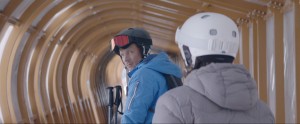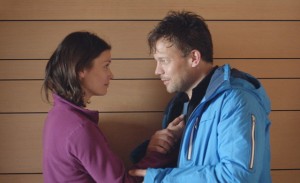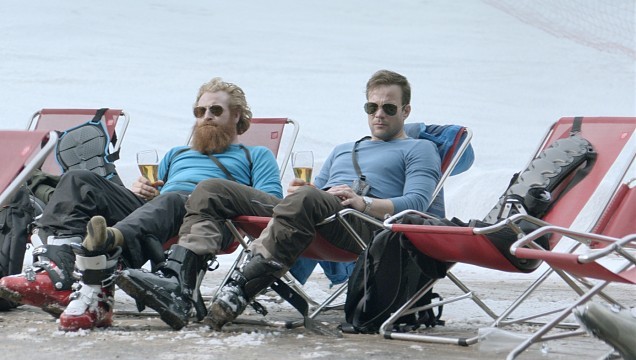With all the talk about the moment in Force Majeure that causes a rift between the upper-class husband, Tomas, and wife, Ebba, on a skiing vacation with their children, it is easy to overlook that the conflict registers not so much in that moment, but in Tomas’s inability afterwards to offer a meaningful apology for his mistake. Thus to talk about the plot gets in the way of what the film is really doing: it works by misdirection.
The music is the first clue. As an ironic reflection of the chilly scenes, “Summer” from Vivaldi’s Four Seasons punctuates the tension. The larger idea is that the conflict, despite the close attention paid to the environment (an almost documentary-like focus on skiing/ski resorts) could occur at any place, the beach, for instance.
Expansive mountains, which the film often emphasizes, promise open space—especially in the widescreen compositions (after all, not just superhero films deserve to be watched in theatres), but instead remind us of the claustrophobia and limited motion we observe. Emerging out of a small apartment, the family members are tightly bundled up in ski gear and carried by moving sidewalks and mechanical lifts to and from the slopes. The rush of freedom in skiing is interrupted by cumbersome bathroom breaks, where gear has to be laboriously removed and then put back on afterwards. Even in the greater comfort of the apartment, the bathroom and other lived spaces feel cramped.
 The rhythms and visuals also keep us off balance. At the beginning, scenes are cut quickly together, giving us the impression of forward motion—but the path feels rather bumpy. In longer takes, bodies are cut off or shown from the back, so we cannot see fully personal expressions. Often the low camera position (influenced by the trademark style of Yasujiro Ozu) brings us closer to Tomas, Ebba, and their friends sitting and talking, but when someone gets up and leaves we do not see them until they return. Force Majeure shows us that even people who know each other fairly well tend not to stay grouped together, a lack of cohesion that, along with frequent breaks in conversation, points to the tension between Tomas and Ebba.
The rhythms and visuals also keep us off balance. At the beginning, scenes are cut quickly together, giving us the impression of forward motion—but the path feels rather bumpy. In longer takes, bodies are cut off or shown from the back, so we cannot see fully personal expressions. Often the low camera position (influenced by the trademark style of Yasujiro Ozu) brings us closer to Tomas, Ebba, and their friends sitting and talking, but when someone gets up and leaves we do not see them until they return. Force Majeure shows us that even people who know each other fairly well tend not to stay grouped together, a lack of cohesion that, along with frequent breaks in conversation, points to the tension between Tomas and Ebba.
Scenes work together, but not as expected. Ebba has a beer with a woman she has met at the resort, who has already had a few one night stands. The woman explains that she and her partner, who has stayed home, have an open relationship. Her unflinching description of her philosophy about love and sexual pleasure challenges Ebba’s sensibilities and makes her uncomfortable. But rather than compel her to review her own satisfaction (or lack thereof) with her husband, the scene illustrates her uptightness, a product, it is suggested, of a bourgeois lifestyle.
In a later scene, Tomas and his friend, Harry, go off for a carefree afternoon of skiing. On the slopes, Harry encourages Tomas to let out his frustrations by screaming, which he does, but to little apparent effect. While they are relaxing afterwards and drinking beer, as post-emo pop music plays loudly in the background, a youthful and attractive woman approaches Tomas and tells him that her friend thinks he is the best looking man there. As his spirits start to lift, the woman returns and apologizes, saying that her friend was pointing to someone else.
What would serve as a moment of release and, even, temptation in most films further increases the tension and, as with the earlier scene about open relationships, this male-bonding scene depicts uptightness—the conflict is not about either Tomas or Ebba finding another lover at the resort; neither appears even remotely capable of doing so. They are, in a profound sense, stuck with each other, at least for the duration of the trip.
Rather than spelling everything out to dramatically heighten the unresolved conflict, Force Majeure refuses to answer other questions. We have little backstory to any of the characters (not knowing, for instance, what any of them do for a living). When Tomas blurts out that he has been unfaithful, we do not know if Ebba had been previously aware or suspicious of his indiscretion. When Ebba is unable to complete a run, and Tomas has to carry her down the slope, no reason is provided.
 The final surprise is that a film so restrained, claustrophobic, and chilly as Force Majeure can present, in such a loving way, the imperfections and complexities of being human. Rather than seeking cold truths as all the characters seem to be doing, the film warmly welcomes emotional uncertainty. When Ebba has several glasses of wine to give her courage to tell her side of the story to their friends, her inebriation gives her an admirable passion yet also an unpleasant bitterness. When the defense of Tomas’s actions by Harry goes ridiculously overboard, Harry could be showing empathy (at the cost of logic) or reacting out of a misplaced loyalty. Tomas’s emotional outburst appears movingly honest and at the same time verges on overacting, in an attempt to upstage his wife and gain attention from his children. Ebba’s embarrassed response to his outburst is understandable, but makes us wonder if she might lack empathy. If the film, at first, appears more judgmental of Tomas, by the end the tables are turned on Ebba as her fear in the closing scene may appear out of justifiable concern for her and her family’s well-being, yet that feat is made questionable by not being shared by everyone else around her in the same exact situation.
The final surprise is that a film so restrained, claustrophobic, and chilly as Force Majeure can present, in such a loving way, the imperfections and complexities of being human. Rather than seeking cold truths as all the characters seem to be doing, the film warmly welcomes emotional uncertainty. When Ebba has several glasses of wine to give her courage to tell her side of the story to their friends, her inebriation gives her an admirable passion yet also an unpleasant bitterness. When the defense of Tomas’s actions by Harry goes ridiculously overboard, Harry could be showing empathy (at the cost of logic) or reacting out of a misplaced loyalty. Tomas’s emotional outburst appears movingly honest and at the same time verges on overacting, in an attempt to upstage his wife and gain attention from his children. Ebba’s embarrassed response to his outburst is understandable, but makes us wonder if she might lack empathy. If the film, at first, appears more judgmental of Tomas, by the end the tables are turned on Ebba as her fear in the closing scene may appear out of justifiable concern for her and her family’s well-being, yet that feat is made questionable by not being shared by everyone else around her in the same exact situation.


